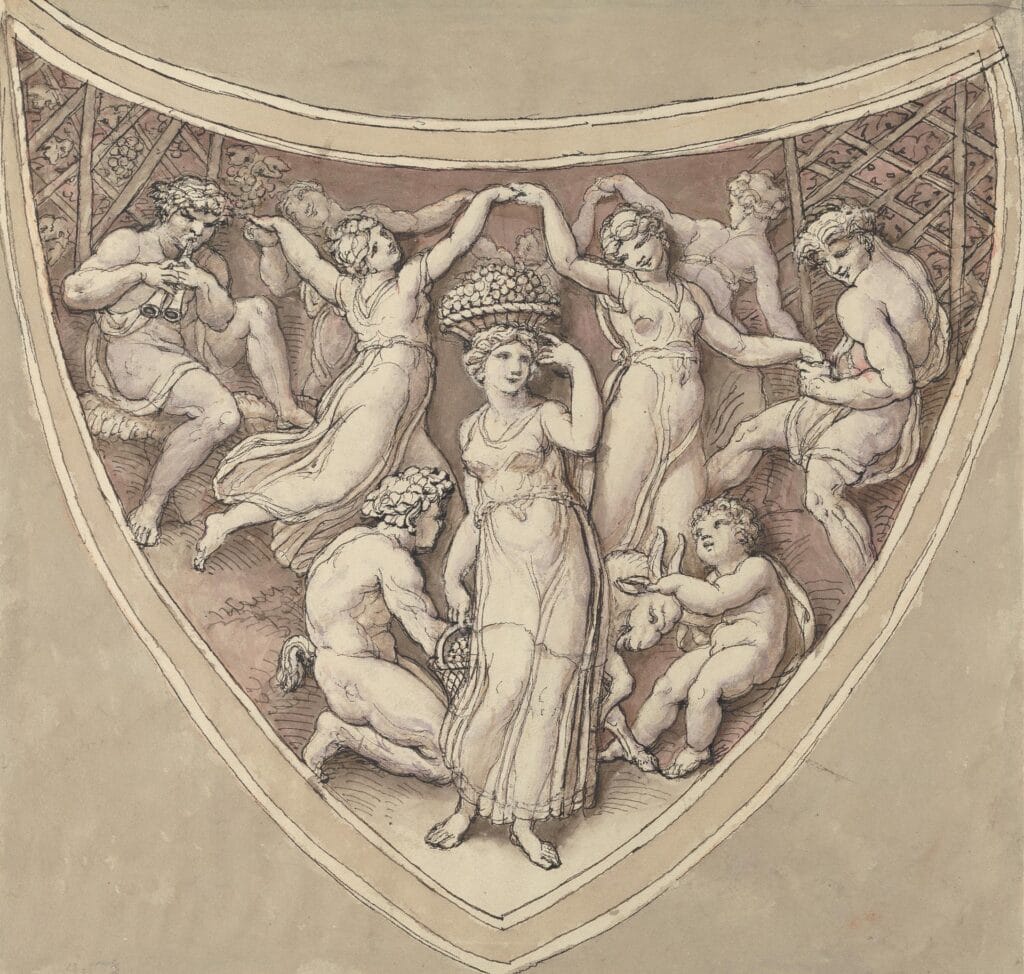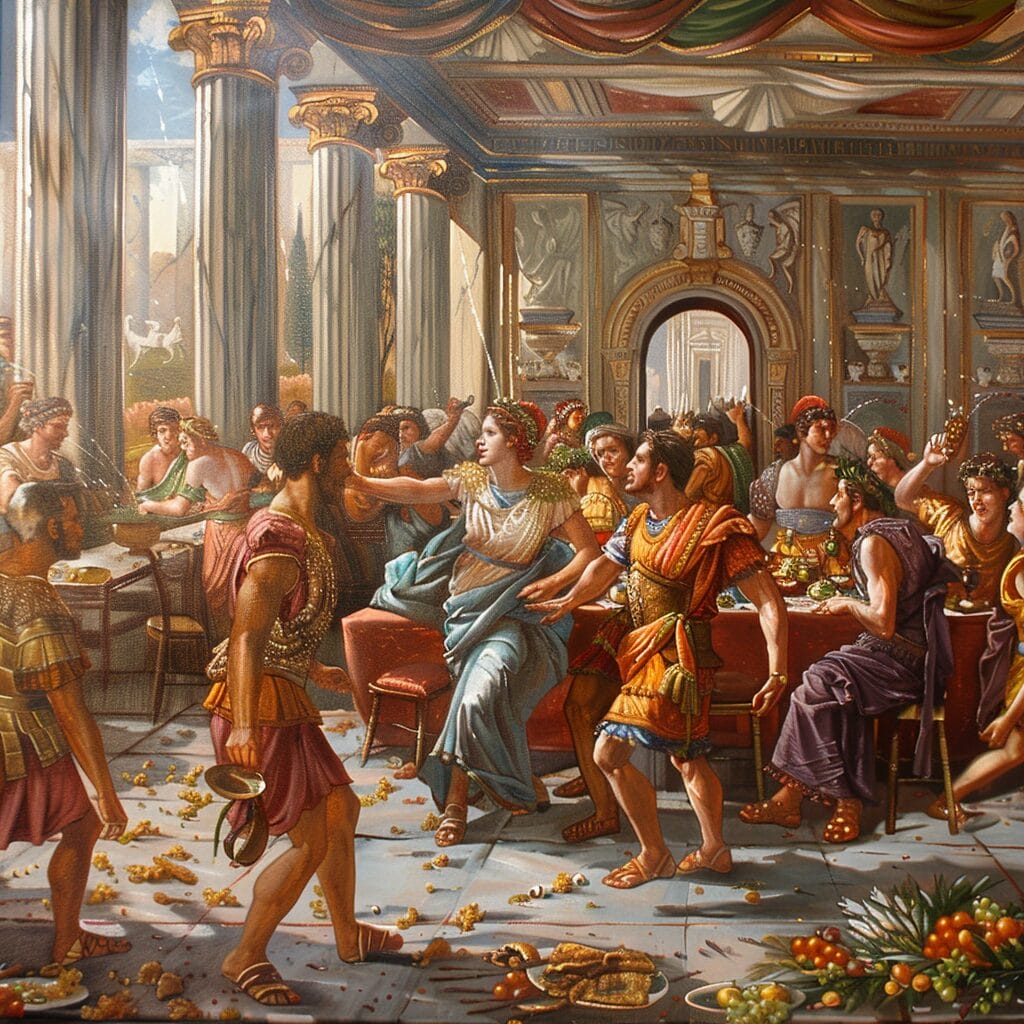The Bacchanalia holds a fascinating and somewhat mysterious place in the history of ancient Rome. These festivals were originally religious rites dedicated to Bacchus, the god of wine, freedom, and ecstasy. Held in Italy from as early as 200 BC, the Bacchanalia was a space where Romans could indulge in revelry, theatrical performances, and ecstatic celebrations.
The cultural practices of Bacchanalia evolved over time, blending various customs and rituals, which often included ecstatic dances and communal feasting. Originally, these rites were private, exclusive to women, and held thrice yearly. Over time, men were included, and the celebrations grew more frequent and less private. These changes led to suspicions among Roman authorities, who feared the gatherings could incite political subversion.

The Bacchanalian Scandal of 186 BC marked a turning point when the Roman Senate severely limited these festivals due to perceived threats to the state’s stability. Concerns about potential conspiracies and moral degradation provoked harsh responses, restricting the scale and frequency of Bacchanalia. Despite the crackdown, the legacy of these celebrations continues to intrigue historians and enthusiasts alike.
Key Takeaways
- Bacchanalia were ancient Roman festivals dedicated to Bacchus.
- The rites evolved from private ceremonies to broader, more frequent celebrations.
- The Roman Senate’s crackdown in 186 BC significantly curtailed these festivals.
Historical Origin and Transformation
From Dionysus to Bacchus
Dionysus was originally a Greek god associated with wine, fertility, and revelry. His worship centered on the Greek rituals known as the Dionysia. As Greco-Roman culture intertwined, Dionysus became Bacchus in Roman myth. This transition was more than a change in name. Roman Bacchus absorbed many attributes of Dionysus but also adapted to the existing Roman religious framework. Bacchanalia rituals mirrored Dionysian celebrations but catered to Roman sensibilities.

Influence of Greek Dionysia
The Greek Dionysia heavily influenced the Bacchanalia. Held in honor of Dionysus, these festivals featured dramatic performances, ecstatic dances, and rituals celebrating life’s fertility and abundance.
As these practices spread to Southern Italy, they evolved under local traditions. Greek benchmarks such as theatrical plays and processions remained, but the flavor of worship adjusted to incorporate Roman and Italic elements. This blend helped preserve the fervent nature of Dionysian worship while fitting it within the Roman context.
Paculla Annia and the Changes to the Bacchanalia
Paculla Annia, a priestess of Bacchus, reformed the Bacchanalia festivals in Rome around 186 BC. Originally a women-exclusive event, Annia opened the rituals to men and expanded the number of annual celebrations.
Her changes drew attention from Roman authorities concerned about the gatherings’ potential for political conspiracies while some worried about the public morale. This led to the Roman Senate’s intervention, resulting in strict regulations to control participation. Thus, the Bacchanalia transformed from intimate local rites into structured and state-monitored celebrations, illustrating the shift in how religious practices adapted to the political landscape.
In essence, the Bacchanalia’s transformation reflects the dynamic interaction between tradition, religious innovation, and socio-political influences throughout ancient Italy.
Cultural and Religious Practices
The Bacchanalia involved a series of elaborate rituals, the central role of wine in celebrations, and the historical shift in participant demographics.
Rituals and Rites
The Bacchanalia were celebrated with a set of well-defined rites that included intoxication, dancing, and song. Participants engaged in frenzied dancing, aiming for states of ecstasy. These rites usually took place in forested areas or shrines decorated with symbols like ivy and vines.
Sacrificial offerings were made to Bacchus, the god of wine, to seek favor and blessings. Such offerings often included wine, grapes, and small animals. Prayers and hymns dedicated to the god formed another critical part of the ritual activities, reinforcing the spiritual essence of the celebration.
Role of Wine and Revelry
The wine was indispensable in the Bacchanalia, both as a sacred symbol and as a means of achieving intoxication to connect with the Bacchus. Drinking contests and communal consumption of wine heightened the sense of revelry. The participants believed that through intoxication, they could achieve spiritual enlightenment and unity.
Revelry often included theatrical performances reenacting the mythological stories of Bacchus, further enriching the cultural tapestry of the event. Singing and dancing accompanied by musical instruments were also numerous, allowing the participants to immerse themselves fully in the hedonistic atmosphere.
Exclusivity
Initially, the Bacchanalia was exclusive, often restricted to secretive cult members. These members operated under stringent guidelines to maintain the sacredness of the rituals.
Women played crucial roles, not just as participants but also as officiators of rites. Their involvement added layers of complexity to the celebrations, as female participants often emphasized devotion through more expressive forms of dancing and singing. Women’s inclusion marked a significant cultural shift in these religious practices, reflecting broader societal changes.
The Bacchanalian Scandal and Response
The Bacchanalian scandal of 186 BC shocked Rome with accusations of secretive and illicit practices. The Roman Senate’s intervention, the decree and its legal repercussions, and the cultural and societal impacts are critical to understanding this historical episode.
The Scandal
The chain of events began when a woman named Hispala Faecenia, a freedwoman and former participant in the rites, revealed to the consul, Postumius Albinus, that the Bacchanalia had degenerated into debauchery, political conspiracy, and criminal activities. Hispala’s testimony indicated that these gatherings involved excessive drinking, sexual promiscuity, and even murder.
Roman Senate’s Intervention
The Roman Senate acted swiftly to address the scandal. Accusations included participation in secret rituals and extreme levitas animi, or fickleness of spirit. These secretive activities were seen as a direct threat to Roman religious authority and societal stability. An investigation revealed a well-organized conspiracy reportedly involving thousands, including both men and women. The Senate’s primary concern was the subversion of traditional religious laws and the potential for political scheming within these secret gatherings. The Senate didn’t have a problem with public morale.
Decree and Legal Repercussions
The Senate issued a decree to dismantle the Bacchanalian cult, declaring its practices forbidden. Senatorial legislation mandated the closure of all Bacchanalian colleges throughout Rome and Italy. Those found guilty faced severe penalties.
Many members were arrested, and some were executed, reflecting the Senate’s determination to reassert control. The decree also imposed restrictions on future religious gatherings, requiring Senate approval for any similar activities, emphasizing the importance of oversight.
Cultural and Societal Impacts
The scandal significantly influenced Roman society. The Roman authorities’ crackdown transformed the public perception of mystery cults, casting them as subversive elements rather than religious communities.
The response demonstrated the Senate’s commitment to maintaining traditional values and its ability to enact religious and social reforms swiftly. This intervention highlighted the power dynamics between religious authorities and state control, shaping future interactions and legal frameworks.
Table: Key Actions Taken by the Senate
| Action | Outcome |
|---|---|
| Investigation | Exposed conspiracy involving thousands |
| Decree | Banned Bacchanalian practices, closed colleges |
| Legal Repercussions | Arrests and executions of members |
| Restrictions on Gatherings | Required Senate approval for future meetings |
The enforcement of these measures highlighted Rome’s capacity for stringent control, reinforcing the Senate’s authority over religious and social spheres.
People Also Ask:
What events are traditionally associated with a Bacchanalia?
Traditional Bacchanalia involved feasts, music, dancing, and ecstatic celebrations dedicated to Bacchus, the god of wine. These gatherings were typically marked by drinking, mystery rites, and various forms of entertainment.
How did the Roman Bacchanalia evolve over time?
Roman Bacchanalia transformed from secretive, small-scale gatherings into widely known events. Initially met with suspicion and regulation by Roman authorities, the celebrations eventually became more publicly accepted and integrated into Roman culture.
In what ways does a modern Bacchanalian party differ from its historical counterpart?
Modern Bacchanalian parties emphasize gourmet food, fine wine, and themed entertainment. Unlike the ancient rites, which were religious and often shrouded in secrecy, contemporary celebrations are typically more social and less ritualistic, focusing on the pleasure of the senses.
What was the Bacchanalia scandal?
The inquiry claimed that under the cover of religion, priests and acolytes broke civil, moral, and religious laws with impunity; weak-minded individuals could be persuaded to commit ritual or political murders undetected, at the behest of those who secretly controlled the cult, right in the heart of Rome.
What about the Bacchanalian rites that were so objectionable to the Roman establishment?
The dramatic increase in the popularity of these rites, coupled with the fact that they encouraged the involvement of various “lesser” citizens (such as slaves, women, and youths), led the Roman Senate to pass an edict banning all unauthorized worship of Bacchus in 186 BC.
How do you properly pronounce ‘Bacchanalia’?
The word ‘Bacchanalia’ is pronounced as “BAH-kuh-NAY-lee-uh.” Emphasis is placed on the second syllable, ensuring clear and correct articulation.
What are the historical roots of Bacchanalia festivities?
The Bacchanalia originated in ancient Rome, drawing from earlier Greek Dionysian rites. These festive ceremonies celebrated Bacchus, the god of wine, and were integral to religious and social life in Roman society, symbolizing freedom, ecstasy, and fertility.

Hello, my name is Vladimir, and I am a part of the Roman-empire writing team.
I am a historian, and history is an integral part of my life.
To be honest, while I was in school, I didn’t like history so how did I end up studying it? Well, for that, I have to thank history-based strategy PC games. Thank you so much, Europa Universalis IV, and thank you, Medieval Total War.
Since games made me fall in love with history, I completed bachelor studies at Filozofski Fakultet Niš, a part of the University of Niš. My bachelor’s thesis was about Julis Caesar. Soon, I completed my master’s studies at the same university.
For years now, I have been working as a teacher in a local elementary school, but my passion for writing isn’t fulfilled, so I decided to pursue that ambition online. There were a few gigs, but most of them were not history-related.
Then I stumbled upon roman-empire.com, and now I am a part of something bigger. No, I am not a part of the ancient Roman Empire but of a creative writing team where I have the freedom to write about whatever I want. Yes, even about Star Wars. Stay tuned for that.
Anyway, I am better at writing about Rome than writing about me. But if you would like to contact me for any reason, you can do it at contact@roman-empire.net. Except for negative reviews, of course. 😀
Kind regards,
Vladimir
